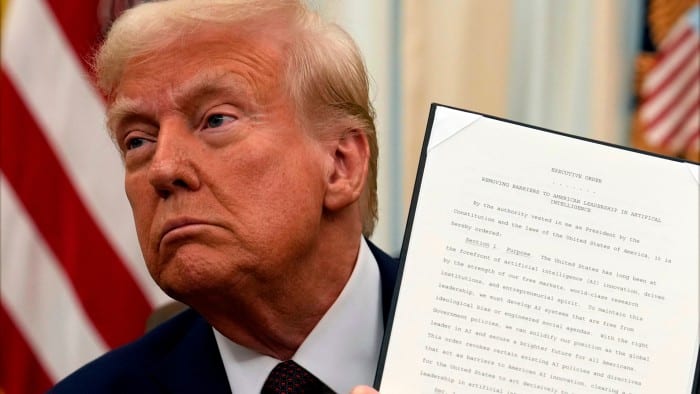[adrotate group="2"]
Donald Trump has intensified the pressure on Federal Reserve Chair Jay Powell to reduce borrowing costs, potentially leading to a conflict between the two just days before the US central bank is set to make its interest rate decision.
During an event in the Oval Office on Thursday where he signed multiple executive orders, Trump asserted that he has a better understanding of interest rates than the Fed and expressed a desire for significant reductions.
The Federal Reserve is widely anticipated to maintain its benchmark rate at 4.25-4.5 percent in the upcoming meeting, following three consecutive cuts since September. The Fed has indicated a more gradual approach to further reductions this year, with some officials expressing concerns that Trump’s strategies, including increased tariffs, tax cuts, and immigration enforcement, may complicate efforts to lower inflation to the targeted 2 percent.
Mahmood Pradhan, an economist at Amundi, noted that the Fed’s apprehensions extend beyond tariffs, indicating an awareness that fiscal policy will not effectively reduce inflation.
Trump stated he expects the Fed to heed his calls and mentioned he would reach out to Powell “at the right time.” He remarked, “I think I know interest rates much better than they do,” and pledged to make his disagreements known.
Although Trump nominated Powell for the Fed chair position during his previous term, he frequently criticized him, particularly for not reducing rates swiftly enough in 2019. Trump has indicated he would not seek to remove Powell before his term ends in 2026.
Douglas Holtz-Eakin, president of the American Action Forum, remarked that if the Fed keeps rates high while Trump desires lower rates, a conflict could arise. Some economists believe that if Trump’s policies cause prices to rise, the Fed might refrain from further cuts or even consider raising rates.
Mark Blyth, an economics professor at Brown University, warned that if the administration’s actions lead to significant inflation, the Fed is obligated to increase rates, even if it leads to backlash from Trump.
In a speech earlier in Davos, Trump advocated for reduced rates globally and urged the OPEC cartel to lower oil prices to facilitate this. He reiterated this point later in the Oval Office, suggesting that decreasing energy costs would help alleviate inflation and consequently lower interest rates.
Trump also expressed skepticism about the US commitment to NATO, calling for increased defense spending from allied nations. He remarked, “They’re not protecting us… we should certainly be helping them. But they should raise their defense spending from 2 percent to 5 percent.”
These comments came shortly after Secretary of State Marco Rubio reaffirmed the US commitment to NATO during a conversation with the alliance’s secretary-general.
Among the executive orders Trump signed on Thursday were measures to establish a national cryptocurrency stockpile and to authorize the declassification of federal files related to the assassinations of President John F. Kennedy, former Attorney General Robert F. Kennedy, and civil rights leader Martin Luther King Jr. Trump stated that the American people deserve transparency concerning these events, emphasizing that many have waited for these revelations for years.
photo credit: www.ft.com
[adrotate group="2"]





